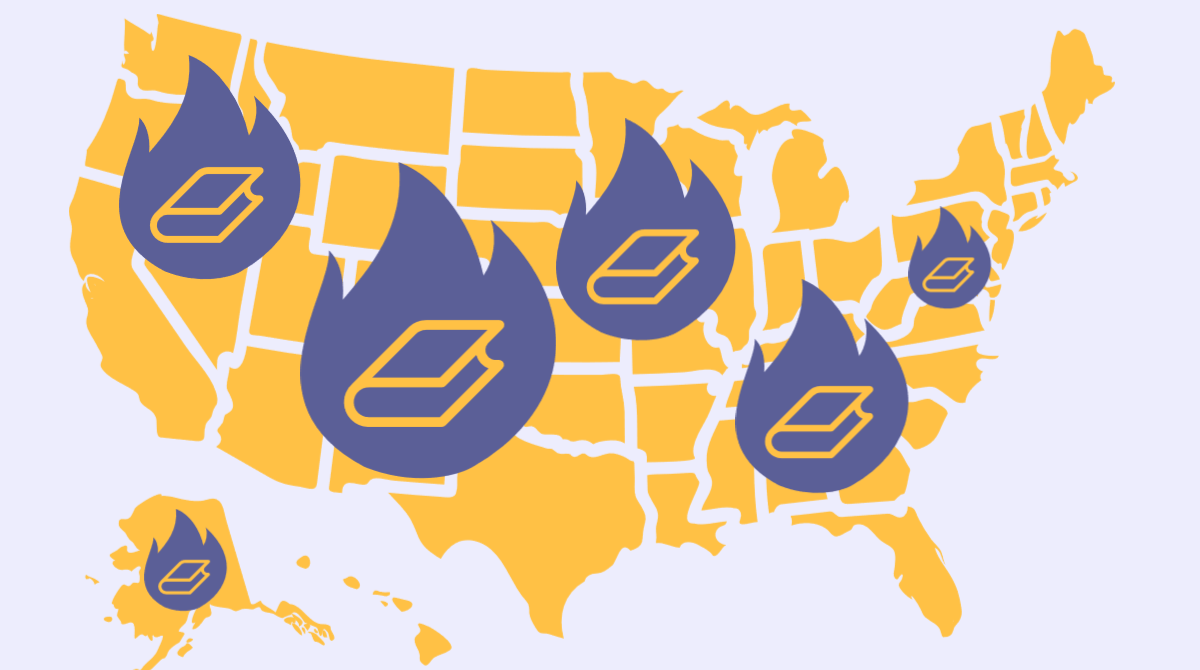Libraries and schools across the country are experiencing unprecedented levels of attempts to ban or remove books from their shelves. I Love Libraries will continue to raise awareness by highlighting attempts to censor library materials, as well as efforts by librarians, parents, students, and concerned citizens to push back against them. This report includes news from Delaware and Texas, an update on Little Free Libraries’ book bans map, and Margaret Atwood’s response to “The Handmaid’s Tale” being banned.
Become a Supporter
Margaret Atwood takes aim at Alberta’s school library books ban with satirical story
Author Margaret Atwood has penned a new satirical short story that takes aim at Alberta, Canada’s controversial ban on school library books containing sexual content after her novel “The Handmaid’s Tale” was yanked from some shelves, reports Global News.
In an August social media post, Atwood said since her book is no longer suitable for Alberta’s schools, she wrote a short story for 17-year-olds about two “very, very good children” named John and Mary. Atwood said the duo paid no attention to the poor and “forgiving your enemies and such; instead, they practiced selfish rapacious capitalism.”
She goes on to say that the duo never die because “who wants to dwell” and they lived happily ever after. “But while they were doing that ‘The Handmaid’s Tale’ came true and (Premier) Danielle Smith found herself with a nice new blue dress but no job,” she said. “The end.”
Over the summer, Edmonton Public School Board announced it was removing more than 200 books from its schools this year to comply with a July order by Alberta’s education ministry to remove books from school libraries that carry “materials containing explicit sexual content” by October 1. The list of removed books includes Maya Angelou’s “I Know Why the Caged Bird Sings,” Aldous Huxley’s “Brave New World,” the Outlander series by Diana Gabaldon, the Game of Thrones books by George R.R. Martin, and books by Alice Munro and Ayn Rand.
‘Freedom to Read Act’ becomes law in Delaware
Delaware Governor Matt Meyer signed House Bill 119, or the “Freedom to Read Act,” which sets statewide standards for how public and school libraries in the state manage challenges to literature on their shelves, into law September 15, reports WBOC News.
Under the legislation, libraries are required to adopt written policies ensuring that books and other materials cannot be removed solely due to partisan, ideological, or religious objections. Public and school libraries would also need to establish clear review processes for objections, but materials under review would remain available until a final decision is made. The bill also provides protections for librarians and library staff, prohibiting disciplinary action or retaliation against them for following the state’s principles on library material selection.
The legislation emphasizes that library materials exist “for the interest, information, and enlightenment of all persons” and cannot be removed because of the creator’s background or views.
Bonnie Elliott, director of Frankford (Del.) Public Library, told WBOC she is hopeful the law will ensure equal opportunities for readers across the state.
“Do I agree with every book that comes in here? No. But do I want people to have their choices? Yes,” Elliott said. “All libraries in the country allow people from different backgrounds to come together and have a conversation. Your mind opens up to possibilities, and without those possibilities, you become a narrow-minded person.”
As censorship escalates, Little Free Library updates its book bans map
A year after launching its interactive Book Ban Map, literacy nonprofit Little Free Library (LFL) updated its map that highlights areas where book challenges and bans are intensifying, as well as the locations of LFL-branded book-sharing boxes, reports Publishers Weekly.
The map was developed by LFL in partnership with the American Library Association’s Office for Intellectual Freedom and PEN America, which both provided LFL with data. Bottom of FormThe map color codes the scale of restrictions upon the freedom to read in each state and county, with darker hues indicating higher rates of challenges and bans. The map includes a hover feature for state banning totals, the ability to toggle between state and counties, and a search function to locate specific states and counties. LFL boxes across the country are indicated on the map with blue pins. There are more than 200,000 LFL-branded boxes worldwide, and 98,000 are in the U.S.
LFL describes its network as a “powerful outlet for those who wish to respond to book censorship,” as the combination of book banning data with book-sharing box locations provides communities with tools to counter restrictions upon the access to books.
“At the Little Free Library, we believe that access to books is a fundamental right and a cornerstone of an informed, engaged society,” LFL CEO Daniel Gumnit said in a statement. “This newly updated map empowers communities to protect intellectual freedom, champion diverse voices, and ensure that the joy of reading remains accessible to all.”
Texas school district bans hundreds of books, ensnaring a beloved children’s book in its wake
A Houston-area school district has unleashed another round of book bans, and a favorited children’s book about a girl who eats too many cupcakes and turns pink is among the affected, reports Chron.
Lamar Consolidated Independent School District has removed nearly 300 works from its libraries and classrooms ahead of the 2025-2026 school year, according to data obtained by the Texas Freedom to Read Project. The district also placed more than 450 books on a “do not purchase” list as it reviews the titles. The district said the sizable number of books were removed because they were “not in line with HB 900,” a law that places greater restrictions on explicit content in libraries.
The removed titles range from classics such as Toni Morrison’s “Beloved” and Kurt Vonnegut’s “Slaughterhouse-Five” to popular children’s fiction such as “Pinkalicious.” Dozens of books were also removed because of “gender fluidity,” including “Gender Queer,” “Hate Crime in America: From Prejudice to Violence” and “My Life as a Diamond.”
Anne Russey, the co-founder of the Texas Freedom to Read Project, called the inclusion of works such as “Pinkalicious” a “very extreme interpretation” of local and state policies. “Pinkalicious” includes a page that depicts a child discovering her body has turned pink after eating too many cupcakes.
“Most children would see the page and see a pink child. They’re not focused on the nudity; that’s not the point of the illustration. But the local policy does prohibit frontal nudity,” Russey said.
It is unclear what prompted the mass removal of these works from libraries and classrooms. Russey said the bans do not reflect what Texas parents want.
“They’re worrying about the safety of our children when we send them to school every day. They’re worrying if they can afford the bill to cover school lunch,” Russey said. “Real parents do not care, they’re not worried about ‘Pinkalicious’ ending up in the hands of a kindergartener. It’s a political strategy, a political battle that’s being fought.”
Take action
Alarmed by the escalating attempts to censor books? Here are six steps you can take now to protect the freedom to read.
- Follow news and social media in your community and state to keep apprised of organizations working to censor library or school materials.
- Show up for library workers at school or library board meetings and speak as a library advocate and community stakeholder who supports a parent’s right to restrict reading materials for their own child but not for all
- Help provide a safety net for library professionals as they defend intellectual freedom in their communities by giving to the LeRoy C. Merritt Humanitarian Fund.
- Educate friends, neighbors, and family members about censorship and how it harms communities. Share information from Banned Books Week.
- Join the Unite Against Book Bans movement and visit our Fight Censorship page to learn what you can do to defend the freedom to read in your community
- Become a Supporter of the American Library Association and help ALA fight for libraries and everyone’s freedom to read.
Subscribe to the I Love Libraries newsletter! You’ll get news from the library world, advocacy updates, author interviews, book lists, and more delivered to your inbox every month.



